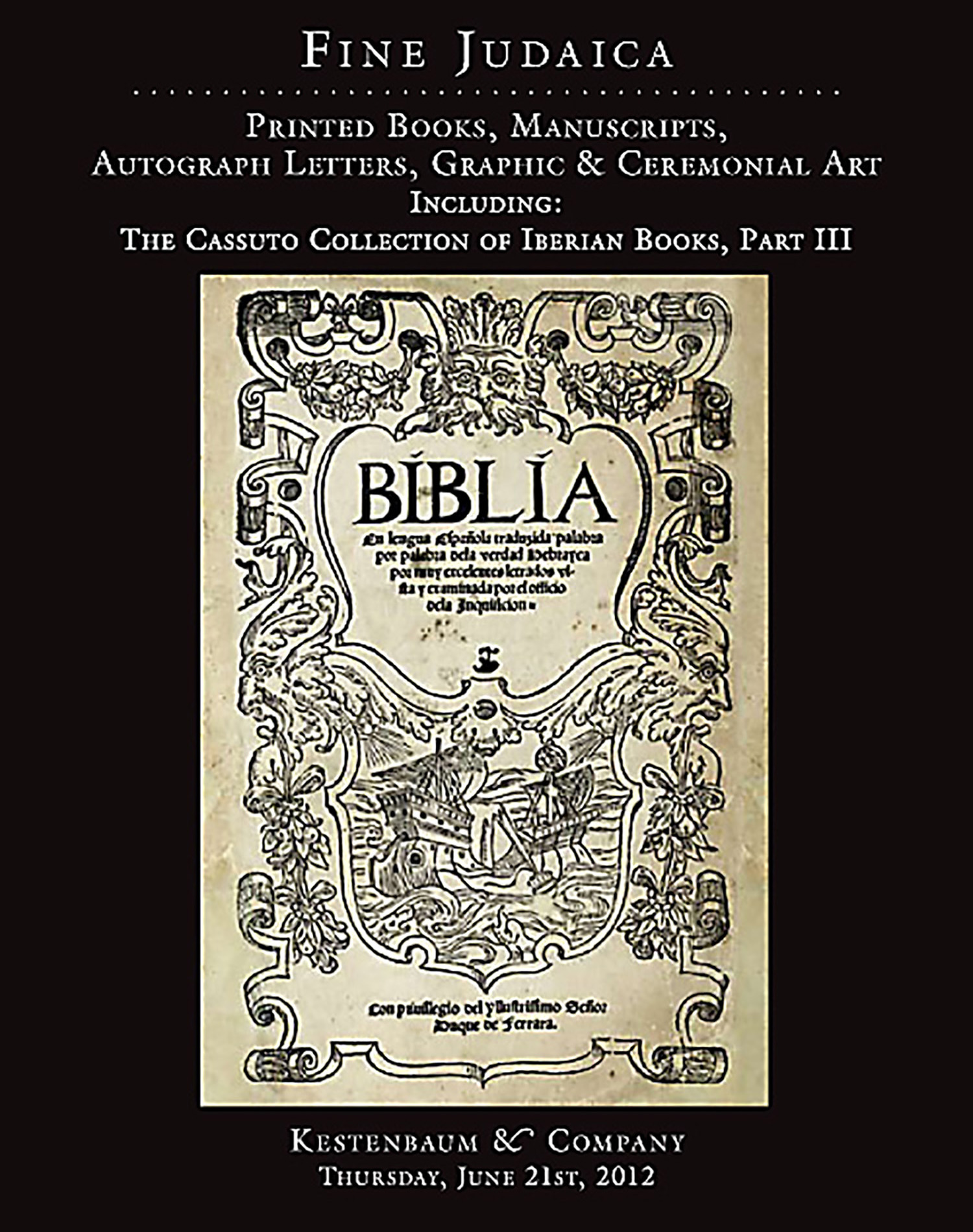Autograph Letter Signed in Hebrew to Reuven Katz, Chief Rabbi of Petach Tikva, in praise of the writer’s son, Rabbi Joseph Dov (Baer) Soloveitchik of Boston in furthering his candidacy for the open position of Chief Rabbi of Tel Aviv.

AUCTION 55 |
Thursday, June 21st,
2012 at 1:00
Fine Judaica: Printed Books, Manuscripts Autograph Letters, Graphic & Ceremonial Art
Lot 296
SOLOVEITCHIK, MOSHE.
Autograph Letter Signed in Hebrew to Reuven Katz, Chief Rabbi of Petach Tikva, in praise of the writer’s son, Rabbi Joseph Dov (Baer) Soloveitchik of Boston in furthering his candidacy for the open position of Chief Rabbi of Tel Aviv.
New York: Erev Rosh Hashanah, 1935
Est: $8,000 - $10,000
PRICE REALIZED $8,500
<<Historic letter relating to Rabbi J.B. Soloveitchik’s Campaign for Appointment as Chief Rabbi of Tel-Aviv.>>
Upon the death in 1935 of Solomon Aronson the Chief Rabbi of Tel-Aviv, an intense search began for a successor. The primary candidates vying for the position, considered one of the most prestigious in the rabbinic world, were Moses Avigdor Amiel (1883-1946), Rabbi of Antwerp since 1920, and the relatively young Joseph Dov Soloveitchik (1903-1993), Rabbi of Boston since 1932.
As displayed in the present letter, Soloveitchik’s father, R. Moshe Soloveitchik, engaged in intensive lobbying to secure the position for his son. Ultimately however, R. Amiel was elected Chief Rabbi of Tel-Aviv.
R. Moshe Soloveitchik (1876-1941) was the son of R. Chaim Halevi Soloveitchik of Brisk, (“R. Chaim Brisker”) renowned for having revolutionized the methods of Talmud analysis. Besides transmitting his father’s teachings, R. Moshe applied his own unique methodology and developed novellae in his own right. After a brief stint in the rabbinate, first in Rassein, and later in Chaslavitch, Russia, R. Moshe taught Talmud in the Tachkemoni School of Warsaw. Thereafter he was appointed Rosh Yeshiva of Yeshiva R. Yitzchak Elchanan (Yeshiva University), New York, where he taught until his death.
The present momentous letter is addressed to Reuven Katz, Chief Rabbi of Petach Tikva (author of Degel Reuven), formerly Rabbi of Stavisk and one of the fourteen students chosen by the Alter of Slabodka to study under R. Isser Zalman Meltzer in Slutzk.
After extending greetings for the upcoming New Year, R. Soloveitchik thanks Rabbi Katz for the honor he bestowed upon his son, “the extraordinary Gaon,” when he last visited the Holy Land. “I request that in the future you will also make an effort on his behalf [to obtain the Tel Aviv Chief Rabbinate.] For there is no doubt that he is the most unique candidate for all aspects of this position. He is the Gaon Hador, the greatest in this generation in regard to comprehension and knowledge in all subject areas of Torah. His understanding reaches unfathomable depths, indeed the Halachah is as he decides, in all areas. He is quite brilliant in secular knowledge too, with clarity and depth and is most influential. His great talents and abilities in all areas grow in breadth each and every day, as waters that have no end, with youthful, invigorated strength. With all this, his fear (of God) comes first before his intellectual abilities. He is a Tzaddik and a Chassid in his conduct. Whatsoever he turns to, he sanctifies the Heavenly Name. He defends the education of Jewish children and brings them close to their Nation and His Torah. He is the person who will influence all ranks and layers of society and will be a crown of beauty for Tel Aviv in particular.”
Continuing, R. Moshe Soloveitchik now specifically addresses in the letter, concerns that were widespread: “I hear people say he is too young. Firstly this is not true, he is between thirty and forty. In previous generations the most talented geniuses and the true giants of the generation were accepted to the most important positions at this age and their opinions determined all significant issues within Judaism. Those who were older, lived alongside them in peace and friendliness and each honored the other. This is his greatness - that at his age he is considered as the oldest of the old. Who is old? - one who has gained knowledge. He can say as R. Elazar Ben Azariah - I am as a man of seventy. He also can say that he is like [R. Elazar] in the fact that he was the tenth generation of Ezra. He can say this from both sides (an allusion to both the paternal Soloveitchik and maternal Feinstein pedigrees)… In every generation it is wisdom which has been the determining factor that has built up and defended the Jewish nation… I therefore request from your honor that you be influential in the proper appraisal of this matter with consideration for the good of the nation and the most suitable candidate. Do not consider trivial side issues. Thus everyone will realize that he is the most eligible, fitting individual for this post. No one can be compared with him in all and every aspect.”
The Manfred Lehmann Collection possesses a related letter from R. Moshe Soloveitchik written to Jacob Joshua Bauminger, Secretary to the Religious Council of Tel-Aviv, dated Elul 19th, 1935, about which Lehmann wrote, “Tel-Aviv’s loss was Boston’s gain… (For) as we all know, the vote, two months later, fell on Rav Amiel, and it was through this historic decision that Providence saved the Rav (Soloveitchik) for America. Orthodoxy in America was thereby totally reshaped, for which we must be profoundly grateful.”
See EJ, Vol. II, cols. 846-7; Vol. III, col. 496; Vol. XV, cols. 127-8, 132-3.
